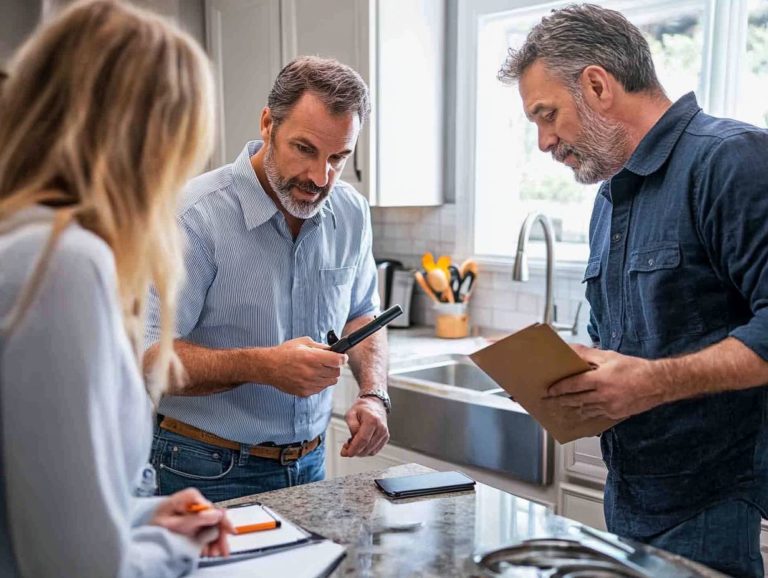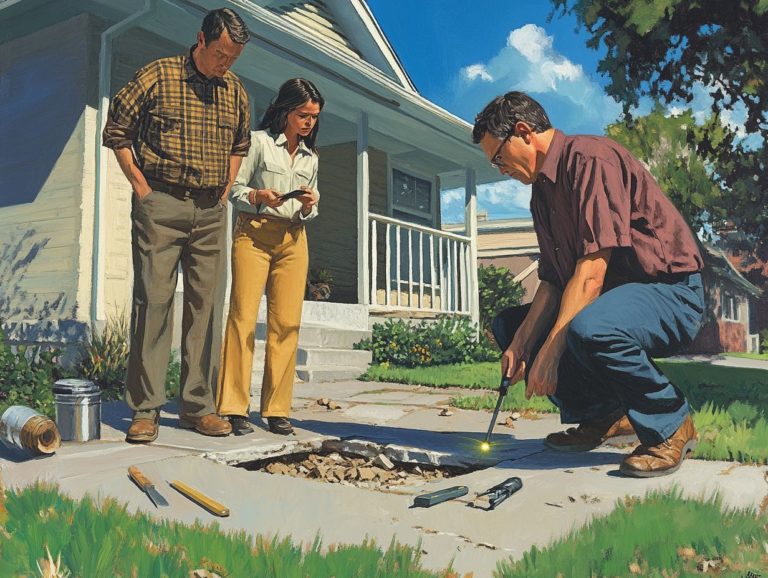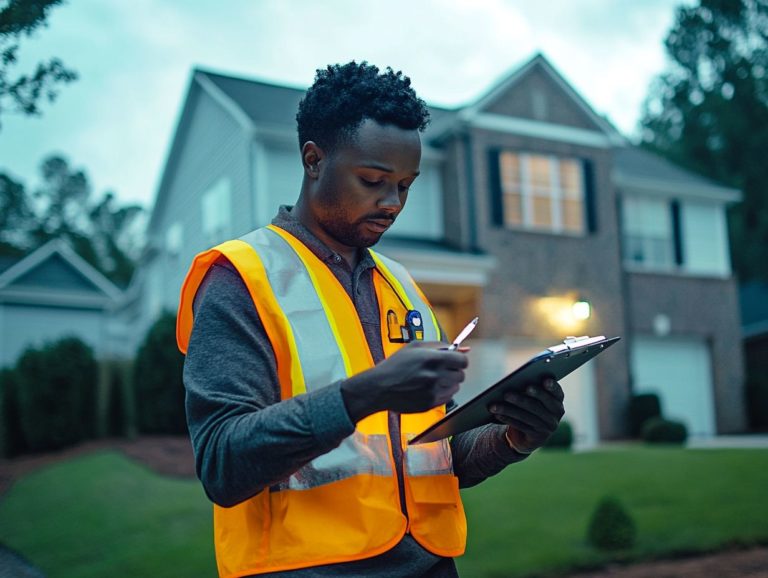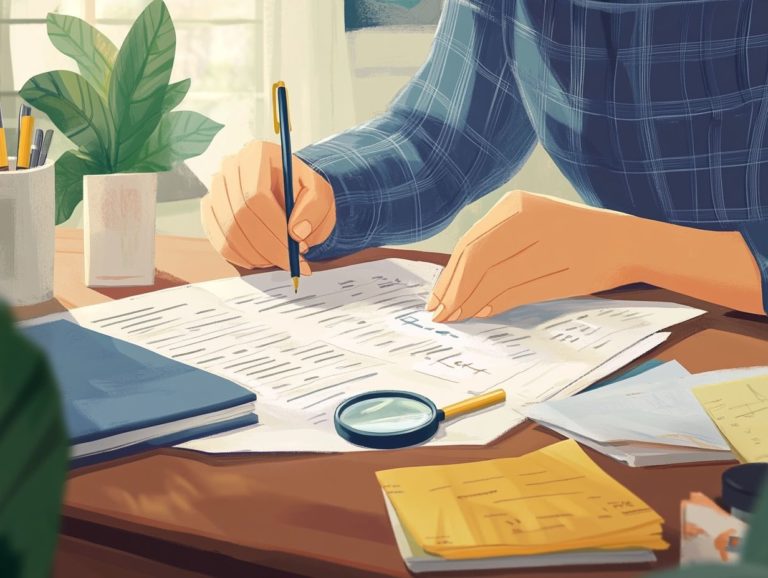The Importance of Home Inspections for Investors
Buying a home stands as one of the most significant investments you re likely to make, and if you’re an investor, the stakes are even higher. A home inspection is your best friend in this journey!
A home inspection is essential for identifying potential issues before they escalate into costly problems. This article delves into what a home inspection involves, emphasizing its importance for investors like yourself and what you can expect during the process.
You will also find common findings, tips for choosing a qualified inspector, and strategies for negotiating with sellers based on the inspection results. Whether you re a seasoned investor or stepping into the market for the first time, grasping the home inspection process is crucial for making informed decisions.
Contents
- Key Takeaways:
- What is a Home Inspection?
- Why Home Inspections are Important for Investors
- The Home Inspection Process
- Common Home Inspection Findings
- Tips for Choosing a Home Inspector
- Negotiating After a Home Inspection
- Frequently Asked Questions
- What is the importance of home inspections for investors?
- What are the benefits of getting a home inspection as an investor?
- When is the best time to get a home inspection as an investor?
- What are some common issues that can be found during a home inspection?
- Do investors need to be present during a home inspection?
- Can investors use the results of a previous home inspection?
Key Takeaways:
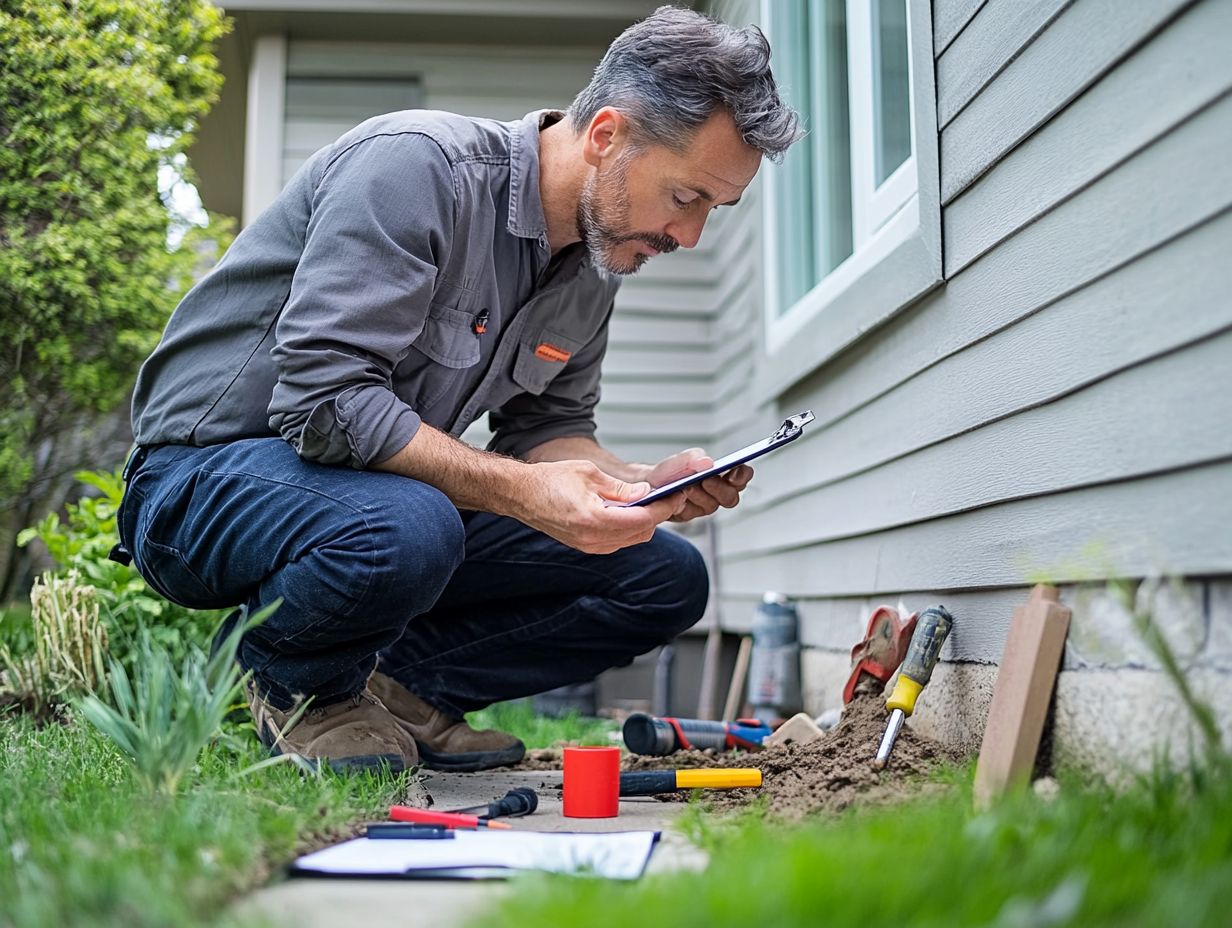
A home inspection is a crucial step in protecting your investment as an investor, as it helps identify potential issues with the property before closing the deal. Understanding the importance of home inspections for property buyers can save you from costly surprises later on.
The home inspection process involves a thorough examination of the property, including its structure, systems, and potential hazards. Understanding the importance of home inspections for real estate transactions gives investors peace of mind and the opportunity to negotiate repairs or price adjustments.
When hiring a home inspector, consider their qualifications, experience, and reputation to ensure a thorough and unbiased evaluation of the property.
What is a Home Inspection?
A home inspection is an essential step in your home buying journey, involving a careful check of the property s condition. It assesses everything from structural integrity to safety hazards, all performed by a qualified inspector.
This process not only helps you gain a comprehensive understanding of your prospective home but also acts as a vital safeguard for your investment. It reveals potential issues before you finalize the purchase.
Definition and Purpose
The definition of a home inspection centers on a thorough assessment of a property. It aims at uncovering potential issues and protecting your investment as both a buyer and a seller.
This essential process acts as a protective measure for anyone considering a real estate transaction. It offers valuable insights into the property’s current condition.
By pinpointing structural deficiencies and plumbing concerns, a home inspection enables you to make informed financial decisions. This ultimately saves you from unexpected repair costs in the future.
It instills a sense of security and confidence in your investment. This ensures you enter the purchase fully aware of the property’s state.
Ultimately, this comprehensive evaluation not only protects your finances but also brings you peace of mind throughout your home-buying journey.
Why Home Inspections are Important for Investors
Home inspections are an essential element for you as an investor, acting as a safeguard for your financial interests. They unveil the true condition of a property and spotlight potential issues that might result in unexpected costs or significant repairs down the line, highlighting the importance of home inspections in real estate deals.
Protecting Your Investment
Protecting your investment through a home inspection is essential for making a sound financial decision. Understanding the importance of thorough home inspections shields you from unexpected expenses that might crop up due to hidden issues within the property.
By meticulously evaluating critical elements like the roof, plumbing, and electrical systems, a home inspection brings to light potential problems that could lead to costly repairs in the future.
You’ll gain peace of mind knowing you’ve taken proactive steps to uncover any maintenance concerns before finalizing the deal. This not only enhances your financial security but also enables you to negotiate repairs or price adjustments with the seller.
Understanding these factors is crucial for anyone looking to make a wise purchase and secure a stable future in their new home.
Identifying Potential Issues
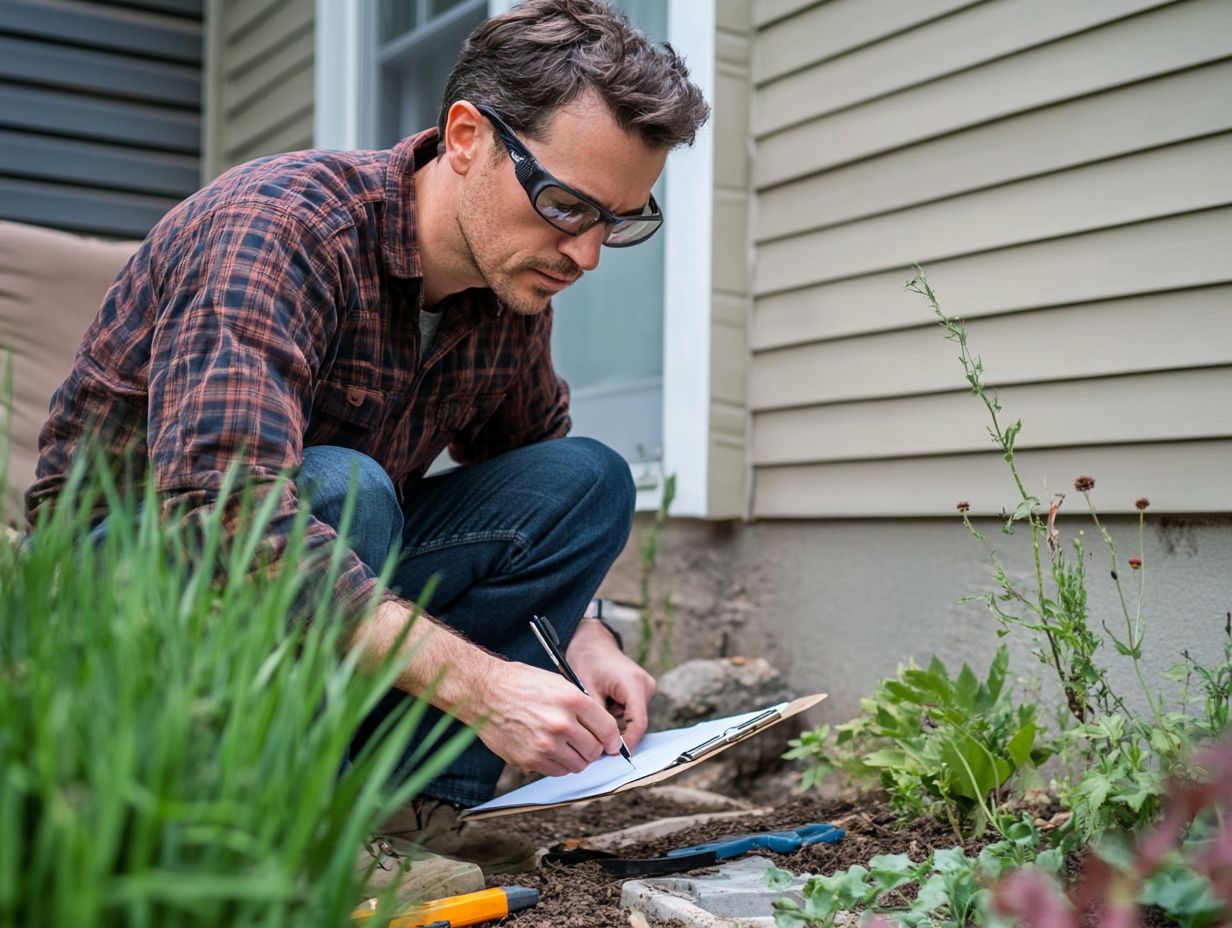
One of the primary advantages of a home inspection is its ability to pinpoint potential problems. These can range from safety hazards and issues with the structure of the house to roof leaks and plumbing problems. Each of these can significantly affect a property’s value and safety.
A thorough inspection can also reveal hidden dangers. For example, electrical wiring faults or mold presence can pose serious health risks if left unaddressed.
Signs of water damage might indicate deeper issues, like foundation cracks or poor drainage systems, which threaten your home s stability. Pests can lead to costly repairs and compromise your safety and comfort.
By recognizing these flaws early, you gain leverage in negotiating repairs with the seller. This proactive approach protects your investment and your peace of mind!
The Home Inspection Process
The home inspection process involves a detailed evaluation of various components of a property by a qualified inspector. This expert provides a report that highlights key findings, serving as an essential tool for maintenance planning and ensuring your home s safety.
What to Expect During an Inspection
During a home inspection, expect a qualified inspector to carry out thorough safety assessments. They will examine various home components, including electrical systems, plumbing, and heating and cooling systems.
This evaluation brings potential issues to light and gives you a clear understanding of the property’s condition. You can feel reassured knowing the inspector will assess structural integrity, roofing, and essential safety features like smoke detectors and carbon monoxide alarms.
This inspection also offers a great chance for sellers to address concerns before putting the home on the market, potentially increasing its value. The inspector s role is to deliver an unbiased, detailed report that serves as a crucial tool in negotiations, enabling both parties to make informed decisions about their future.
Common Home Inspection Findings
Common home inspection findings typically uncover a range of concerns. These can include critical defects in the property s structure, safety hazards like roof leaks, and plumbing issues that require immediate attention.
Issues to Look Out For
When undergoing a home inspection, keep an eye out for common issues such as roof leaks, foundation problems, mold infestations, and signs of pests. These factors can significantly impact the overall condition of the property.
As a potential buyer, be particularly vigilant regarding electrical wiring issues and outdated plumbing systems. These problems can lead to expensive repairs later on and may even pose safety hazards.
Ignoring such concerns could diminish the property’s market value and turn your dream home into a financial burden. Environmental factors like poor drainage or groundwater intrusion should raise alarms, as they can cause structural damage and health issues over time.
Being proactive during the inspection ensures you re making a sound investment and avoiding potential pitfalls.
Tips for Choosing a Home Inspector
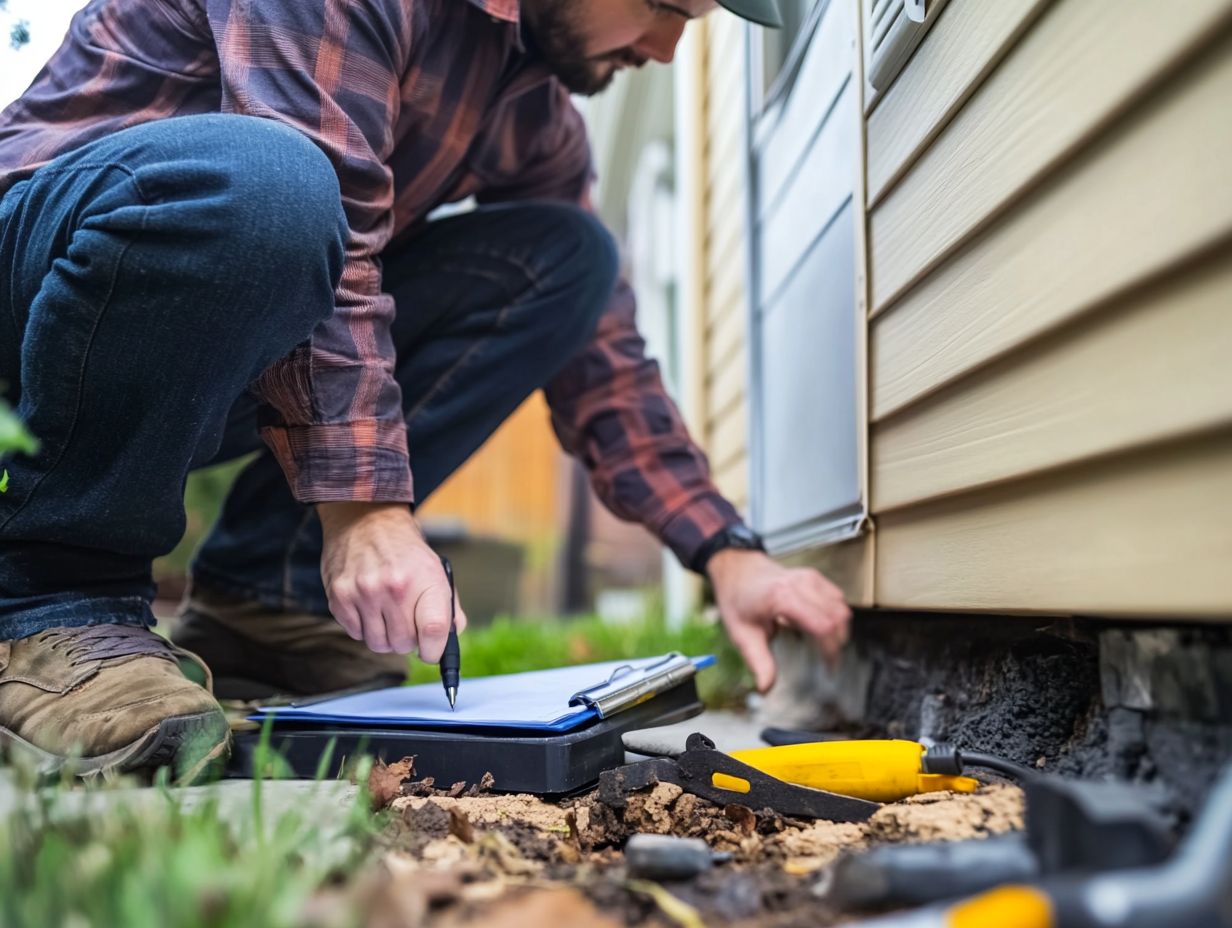
Selecting a qualified home inspector is crucial for a comprehensive inspection process. Their expertise helps uncover safety hazards and potential issues, highlighting the importance of pre-purchase home inspections that could significantly impact your investment.
What to Consider When Hiring a Professional
When hiring a home inspector, consider their qualifications, experience, and client reviews. This ensures they can conduct a thorough inspection.
Relevant certifications enhance the inspector s credibility and show their commitment to industry standards. Specialized knowledge in areas like roofing, electrical systems, or plumbing provides a detailed analysis of the property s condition.
Customer feedback is essential. It gives insights into the inspector s reliability and professionalism. Consistently positive reviews reflect their technical skills and highlight their ability to communicate effectively, ensuring a smooth and informative inspection experience that meets your needs.
Negotiating After a Home Inspection
Negotiating after a home inspection is a key moment in the real estate journey. It s your chance to use the inspection insights to address essential repairs and negotiate effectively with sellers.
This step helps you make informed decisions about your potential investment.
How to Address Inspection Findings with Sellers
Addressing inspection findings with sellers requires a strategic approach. Focus on significant defects highlighted in the inspection report to negotiate suitable repair recommendations.
Start a constructive conversation, emphasizing factual evidence from the inspection results while maintaining a respectful tone. Clearly articulate your specific concerns to foster a collaborative dialogue that helps sellers understand the implications of the reported issues.
Highlight critical repairs that could impact safety or property value. This helps sellers grasp the importance of these findings.
Effective communication leads to outcomes that help both sides. It allows both parties to navigate negotiations with clarity and respect, ultimately resulting in satisfactory resolutions.
Frequently Asked Questions
What is the importance of home inspections for investors?
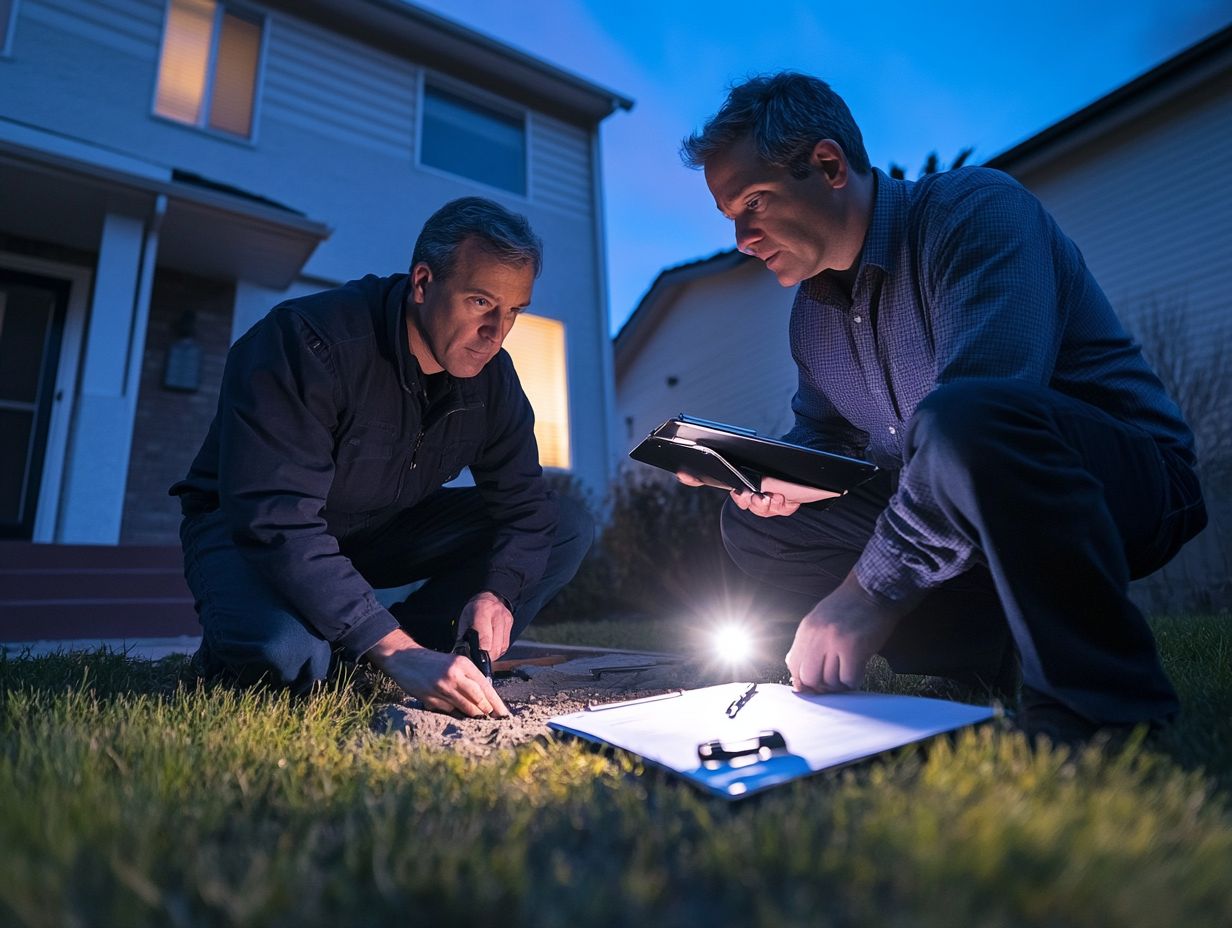
Home inspections are crucial for investors, as they provide valuable information about a property’s condition before making a purchase. Understanding the importance of home inspections in real estate can help ensure a wise investment.
This allows investors to make informed decisions and avoid costly surprises in the future.
What are the benefits of getting a home inspection as an investor?
Getting a home inspection helps investors identify major repairs or safety concerns that may affect the property’s value. This understanding the importance of home inspections is useful for negotiating a better price or planning for future expenses.
When is the best time to get a home inspection as an investor?
The best time for an inspection is during the period when you check details before buying. This allows you to back out of the deal or renegotiate terms if any major issues are found.
What are some common issues that can be found during a home inspection?
Common issues include structural problems, electrical and plumbing issues, roof damage, and pest infestations. These can significantly impact the property’s value and should be addressed before making a purchase.
Do investors need to be present during a home inspection?
While it s not necessary for investors to be present, it is highly recommended. Being there allows you to ask questions, gain a better understanding of the property, and receive detailed explanations from the inspector.
Can investors use the results of a previous home inspection?
It’s not recommended to rely on previous inspection results, as the property’s condition may have changed. It s best to get a new inspection done to identify all current issues.

